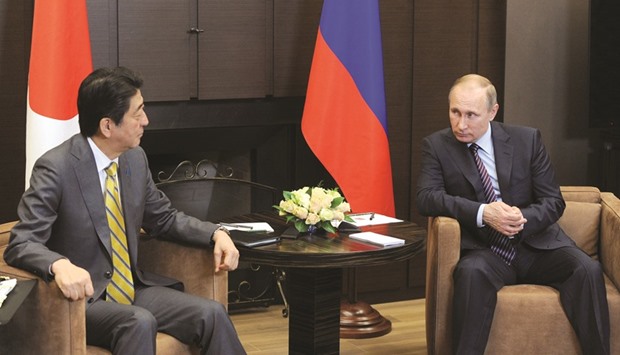Japanese Prime Minister Shinzo Abe met Russian President Vladimir Putin yesterday in a rare visit by a G7 leader as the two sides seek to bolster ties and make progress on a decades-long territorial dispute.
“Japan is not just our neighbour, it is a very important partner for us in the Asian-Pacific region,” Putin told Abe at the start of the meeting in the Black Sea resort of Sochi.
Tokyo-Moscow relations are hamstrung by a row dating back to the end of World War II when Soviet troops seized the four southernmost islands in the Pacific Kuril chain, known as the Northern Territories in Japan.
Japan and Russia’s lingering tensions have prevented them ever signing a peace treaty to formally end World War II hostilities, hindering trade and investment ties.
“We have certain questions that demand special attention, maybe for this reason we must devote special attention to building relationships,” Putin said.
Abe called for the two sides to “frankly exchange opinions” on issues that “are not just bilateral, like politics including the question of concluding a peace treaty, about diplomacy, but the major international ones that stand in front of us and the whole world”.
The Kremlin has dismissed hopes of any major breakthrough towards resolving the dispute at yesterday’s meeting but has played up Abe’s visit as a symbol of warming ties despite Western attempts to isolate Putin.
Both sides have mooted the possibility of starting negotiations on signing a peace treaty, with Japanese Foreign Minister Fumio Kishida saying in April that they could begin “as soon as possible” after the leaders met.
His Russian counterpart Sergei Lavrov said after the talks yesterday that the sides “discussed the problem of the peace treaty”, giving few details but announcing another round of foreign ministry consultations in July.
Lavrov added that Putin and Abe “emphasised their aim to seek ways to improve” falling trade between their countries, but denied that they discussed a potential lifting of sanctions from Moscow by Tokyo, which joined Western countries to slap measures due to the Ukraine crisis.
While in Tokyo last month, Lavrov said Russia wants to “move forward” in relations, but is not prepared to budge on the “result of World War II”.
Despite the warmer words from the Kremlin, tensions between the two sides continue to surface and Japan has hit Russia with sanctions over the Ukraine crisis.
Russia has in turn angered Japan recently by building new modern compounds for its troops stationed on two of the disputed islands.
Russian Prime Minister Dmitry Medvedev also infuriated Tokyo by visiting one of the islands, home to some 19,000 Russians, last year.
Putin said last month that he welcomed Abe’s visit as it comes despite “pressure from (Japan’s) partners, particularly the United States”.
Abe will later this month host a summit of the Group of Seven advanced industrial countries, from which Russia has been excluded over its annexation of Crimea.
“Evidently Japan will try to act as a kind of middleman in the talks process between Russia and the US,” Russia’s government newspaper the Rossiiskaya Gazeta said on Thursday.
US President Barack Obama reportedly asked Abe in February to postpone his trip to Russia, according to sources quoted by Japan’s Kyodo news agency.
Writing in pro-Kremlin daily Izvestia on Thursday, a former deputy foreign minister and ambassador to Tokyo, Alexander Panov, suggested that the meeting could see “Japan drop a number of sanctions” it imposed on Russia over Ukraine.
The leaders are expected to discuss a long-planned visit by Putin to Japan this year, after Lavrov last month urged Tokyo to give a firm date.
The Kremlin said they were also set to discuss economic ties, with Moscow saying their trade turnover last year fell 30% due to low oil prices.

Putin with Abe at the Bocharov Ruchei state residence in Sochi.
